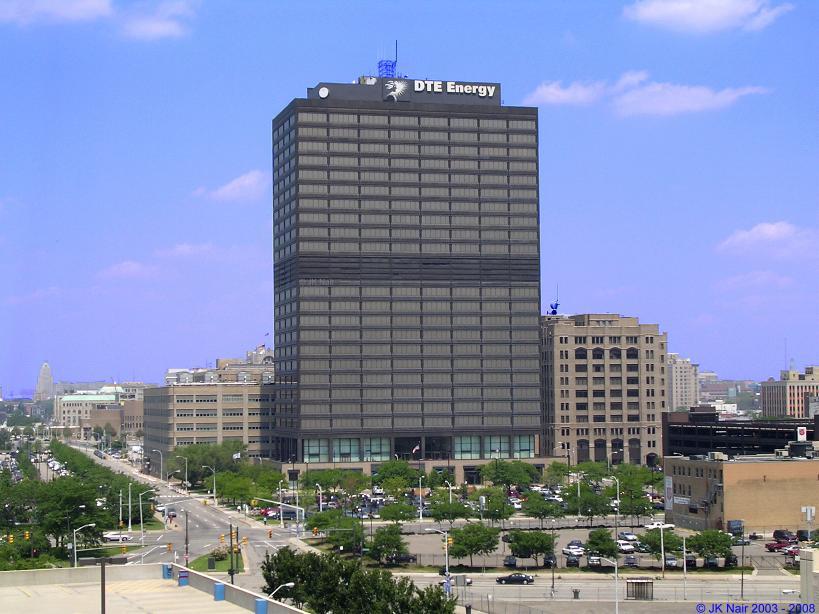
DTE Energy building in Detroit. Image: Wikimedia Commons
By Kaley Fech
Capital News Service
DTE Energy, a major supplier of electricity to Southeast Michigan, plans to double its renewable energy capacity by 2021.
“DTE has about 1,000 megawatts of renewable energy capacity today,” said David Harwood, the company’s director of renewable energy. “What we’re proposing in this new plan that we filed with the Public Service Commission is to increase that capacity to about 2,000 megawatts.”
That’s enough power to serve 800,000 households.
In addition to 2.2 million electric customers in Southeast Michigan, the company supplies natural gas to 1.3 million customers in over 500 communities across the state.
Currently, Michigan law requires electric utilities to generate at least 10 percent of their electricity from renewable sources. That minimum rises to 15 percent by 2021.
“Our plan as required by the law shows how we’re going to get to 15 percent renewable energy by 2021,” Harwood said. “Our plan optimizes the reliability of the grid and the affordability by our customers while achieving that 15 percent.”
The major sources of renewable energy are wind and solar, although there are others.
“The potential for wind power and solar energy is tremendous in a state like Michigan. A lot of people don’t appreciate that,” said John Sarver, the secretary of the Great Lakes Renewable Energy Association. “And the costs have gone down significantly during the past 10 years for both wind and solar power.”
Harwood said renewable energy reduces carbon emissions, increases sustainability and reduces reliance on fossil fuels to generate electricity. The company is expected to close 11 of its coal-fired electric plants by the early 2020s.
However, the Michigan Environmental Council said it’s less than impressed by DTE’s plan.
“Basically what they’ve put on the table is the minimum,” said James Clift, the policy director of the council, which is a coalition of local and statewide environmental groups. “This is just enough renewable energy to take them up to 15 percent by 2021, which is required by law.”
One of the group’s major concerns is DTE Energy’s proposal to build a $1 billion, 1,100- megawatt natural gas-powered plant in St. Clair County.
“We think this is not a balanced approach to Michigan’s energy needs,” Clift said. “We would like to see a much greater commitment to renewable energy.”
There are a number of reasons for greater commitment to renewable energy. Renewable energy can protect customers from rising costs, improve public health and create more jobs than a natural gas plant, Clift said.
Sarver said one issue is commitment and cost.
“I’m always concerned when I see them planning a large natural gas power plant because it’s a commitment that they’re going to have for 50 to 60 years,” Sarver said. “The price of natural gas is fairly low now, but the price of natural gas can be volatile and most likely will go up.”
Clift said cost stability is one advantage of renewable energy.
“If the price of natural gas goes up, the commitment of the new natural gas plant would mean that rates would have to be increased in the future,” he said. “But renewable energy is able to offer a fixed cost, a fixed price for 20 years into the future. So you get low cost and virtually no risk of cost increase in the future — and no other form of energy can promise that.”
And Sarver said that while natural gas is a lot cleaner than coal, it still creates pollution.
“I think the utility should have a greater reliance on renewable energy,” he said. “If they felt they needed to build a natural gas power plant, probably they should build a smaller plant because then you’re not making as big of a commitment.”
The DTE Energy plan includes only what’s required to meet the 15 percent threshold, said Cindy Hecht, a senior communications specialist for the company. She said the company intends to add additional renewable capacity that isn’t in the plan, including a proposal to reduce the company’s carbon emissions by 80 percent by 2050.
The Public Service Commission will review the plan, and if it’s approved, DTE Energy will begin implementing it.